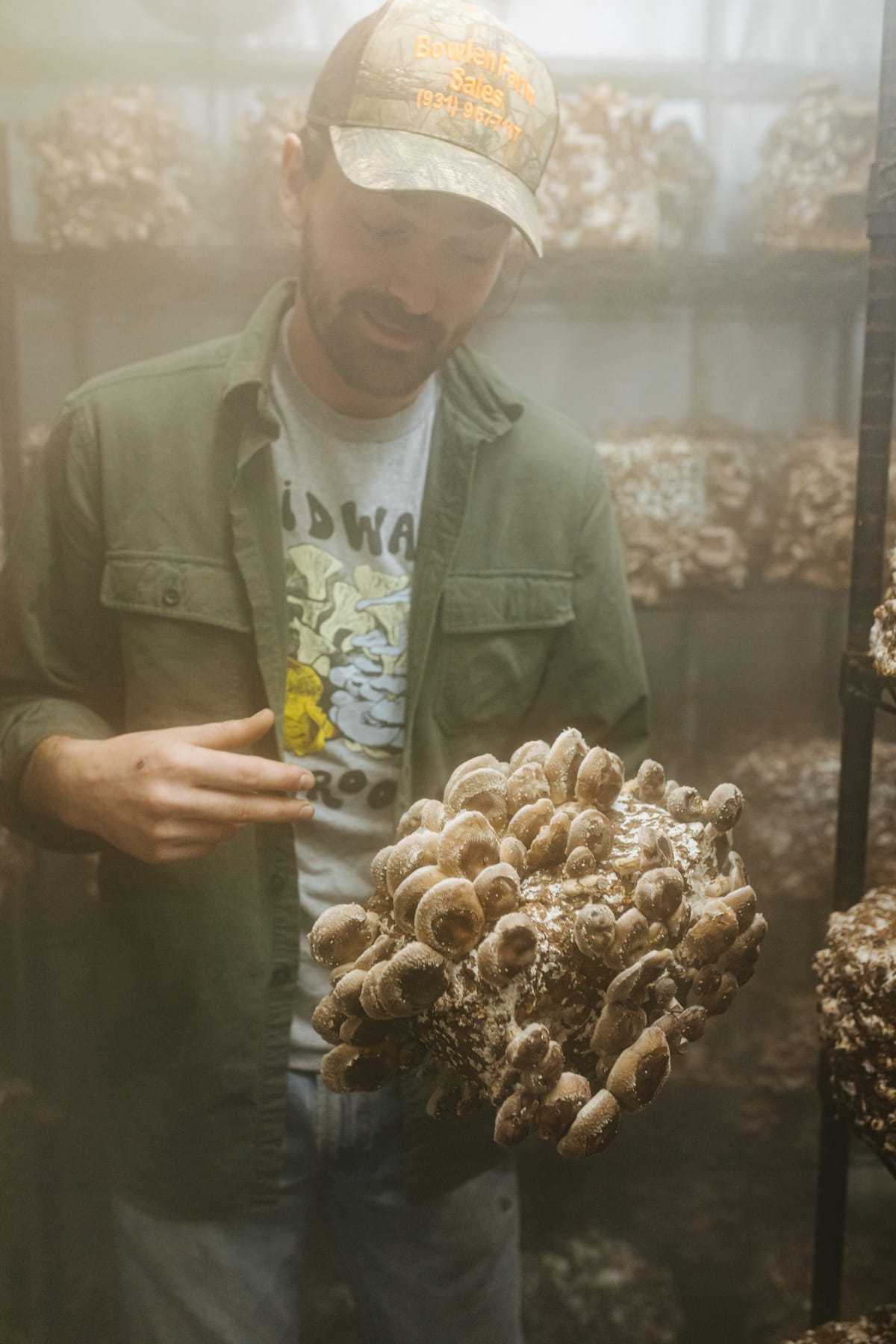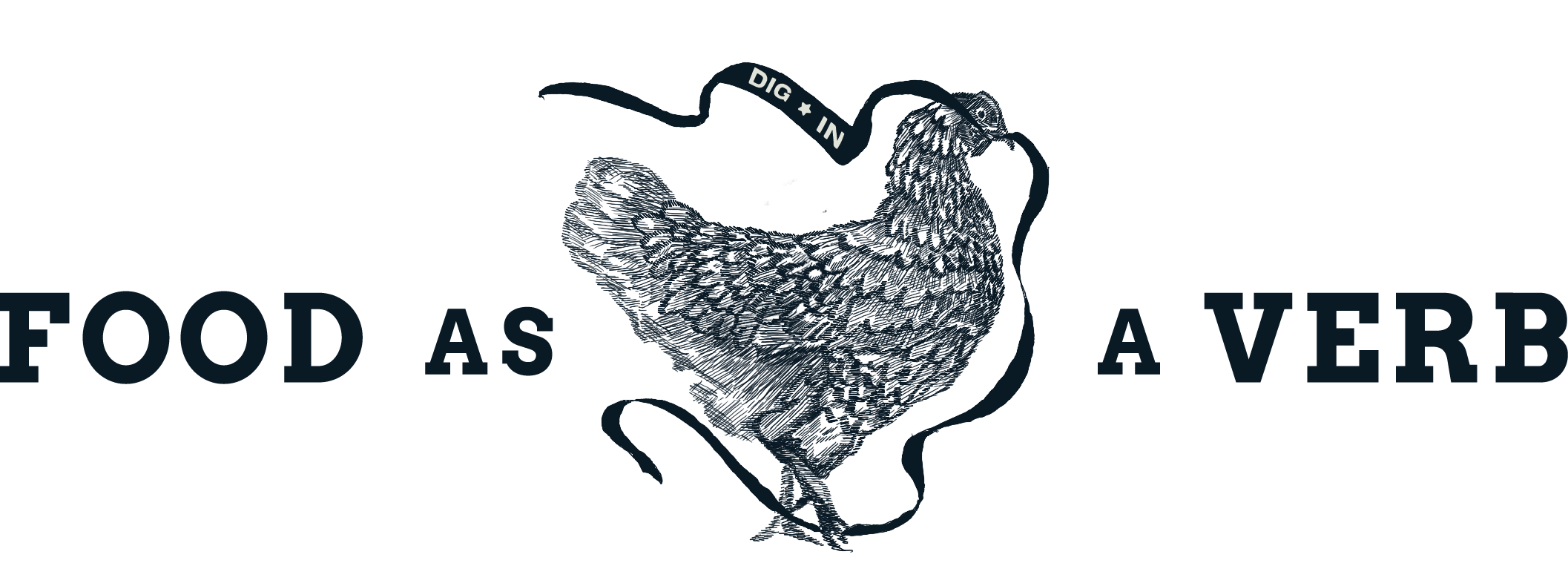How to grow a mushroom farm: a story in three parts.
It all started one Halloween night. There was beer, a ghost pepper and one beautiful vision for farming.

In Sewanee, three friends are growing gourmet mushrooms inside a renovated wood shop. There are foggy fruiting tents, a machine called the Swirling Death Blender and gorgeously good (and sexy) mushrooms. What's not to love?

"This is a really special place up here."
- Part One: Find your people. And take a risk.
It was Halloween 2020. Dressed as a cowboy, Adam Hobbs sat down at a party with good friends Daniel Fortner and Pledger Schaefer. They were drinking beer when somebody passed around a ghost pepper, once considered the hottest pepper on the planet.
So, maybe it was the beer talking.
Or, maybe the yawping we're-still-alive joy that comes from surviving a ghost pepper.
Either way, Hobbs made this Halloween declaration:
Guys, it's time to get serious about our idea.
A few years prior, Hobbs, a poli-sci major, had been tracking for a law career; then, 2016 happened. Disillusioned, he backed away from the legal + political world and began working at a mushroom farm near Nashville.


Daniel Fortner and Adam Hobbs, Midway Mushrooms, Sewanee, Tennesse. (Pledger Schaefer was out making deliveries when we visited.)
For a while, the three friends had been kicking around the idea of starting a mushroom farm.
That Halloween night, Hobbs went double-down on this vision.
He looked at his friends, realizing the potential. Fortner was Sewanee's 2016 valedictorian – "he's brilliant," Hobbs says of his friend and Sewanee classmate – and Schaefer, who graduated from Birmingham-Southern College in 2015, was working missile design for a defense contractor. So, yes: literally, he was rocket-scientist smart.
The next day, Hobbs cold-called about a property near Midway Road in Sewanee: five acres with an old wood shop on site. The owner was interested.
They closed on property in January 2021.
Midway Mushrooms was born.


Food as a Verb thanks our newest sustaining partner, Divine Goods, for its generous support.
Female-and-locally owned, Divine Goods offers beautifully curated gifts for every occasion. Be divine and send someone special a Divine Goods gift - locally sourced when possible, and always thoughtful.
Looking back, two things were apparent about that Halloween night:
I was wearing "a lame-ass costume," Fortner jokes.
And?
"The cold call put it into motion," he said. "This is a really special place up here."

Today, Midway Mushrooms is an indoor mushroom farm in Sewanee, Tennessee, on Monteagle Mountain. It specializes in gourmet mushrooms and sells to restaurants and customers – online and in person – from Nashville to Chattanooga to Huntsville, including every Wednesday at the Main St. Farmers' Market.
"We grow sexy mushrooms," their website declares.
Like all farmers, their entire work is built on relationships. And mushroom mycelium are the most relational of all.
“Mycelium is the neurological network of nature," writes Paul Stamets in Mycelium Running: How Mushrooms Can Help Save the World. "Interlacing mosaics of mycelium infuse habitats with information-sharing membranes. These membranes are aware, react to change, and collectively have the long-term health of the host environment in mind. The mycelium stays in constant molecular communication with its environment, devising diverse enzymatic and chemical responses to complex challenges.”
Just like farmers and friends.
- Part Two: Work hard. Really, really hard.
The trio began cleaning out and repairing the site's old wood shop: re-insulating, fixing water lines, the A/C and electrical systems.
The 3200-square-foot shop had to be turned into an indoor mushroom farm, which would include all the necessary components to turn mycelium into fruiting mushrooms.
They became operational in April 2021, vending at the Main Street Farmers' Market and soliciting area restaurants in a rather, well, unorthodox way.
"We'd show up in our mushrooms t-shirts unannounced at restaurants during service," Hobbs said. "We had to learn."
In early days, they'd produce 250 pounds of mushrooms a week.
Today?
"Our capacity is between 600 to 800 pounds per week," said Hobbs.
It all starts with The Swirling Death Blender.

The Swirling Death Blender is a repurposed compost mixer from a nearby nursery that has a slight Fargo-feel to it. Midway Mushrooms uses fresh hardwood sawdust and pelletized soybean hulls to form a substrate onto which the mushroom will grow. It's not unlike preparing the soil for seeds.
The recipe: 150 pounds of soybean hulls + 150 pounds of sawdust + 25 gallons of water = the substrate that Fortner mixes into six pound bags.



Daniel Fortner, Swirling Death Blender, Midway Mushrooms, Sewanee, Tennessee
The bags are sealed then placed in these huge vats, sourced from a barrel-maker in Knoxville.
Like big steam cookers, the vats cook and sterilize 100 or so substrate-bags at 200 degrees for 25 hours.
"It sterilizes and cleans the substrate which will inoculate the mushrooms," Fortner said.




Sterilizing vats, Midway Mushrooms, Sewanee, Tennessee
Midway sources its grain spawn, or mycelium, from a New England provider. The bags are taken from the sterilized vats to cool, then moved to an ozone-sterilized room for inoculation where the New England spores are mixed with Tennessee substrate.
This mixing is not as scientific as it sounds. Hobbs shakes the hell out of them.
"Literally," he said. "Thirty seconds of shaking."

Then, the fruiting process begins.
The spores interact with the substrate to produce fruit, or, what we call mushrooms. It's all climate-specific and a tad prima donna: mushrooms require high humidity, a dark room and certain temps.
The inoculated bags line a room of 20 to 40 shelves, each holding 50 to 60 bags. Shiitakes, which incubate over a two-month period, sit across from oysters (two weeks) and the fast-tracking lion's mane.
"Ten days," said Hobbs.

Midway's fruiting success rate hovers around 95-98%. Hobbs picks up a bag of fruiting shiitakes, which looks like somebody spilled Folgers inside. Thumps it like a watermelon.
"That really dark color? And how hard they feel?" he said.
They're good signs. The grain spawn are inoculating.



Inoculation room, Midway Mushrooms, Sewanee, Tennessee
After the inoculation room, the bags are transferred to the fruiting tents. Hobbs unzips and holds open the flap; we step into this tent, which immediately feels like this otherworld-wardrobe-Narnia-crossover. A misty, humid fog hangs over rows of fruiting mushrooms. Everywhere, colors like coral: pink, yellow, blue, white, rich-earth browns.

The humidity is so dense, we can't make out faces from the other side of the room. It'd be easy to make some Dead show joke here, but honestly, there is a sense of transcendental, intoxicating wonder; these sprouting lifeforms feel alien almost. It is all gorgeous, the magnificently complex and relational natural world made known through fruiting mushrooms.




Hobbs takes a bag off the shiitake shelf.
"We slap the bags, and that spurs them to fruit," Hobbs said.
Come again? Like hitting and cussing?
"I don't talk mean," he laughs.
The slapping generates fruiting; then, when the time is right, Hobbs, patiently, scissor-harvests each shiitake individually.
"Each mushroom is trimmed off, one by one," he said, holding up a bag of shiitakes.


He shows us the golden and pink oyster mushrooms.

And blue oysters.



Oyster mushrooms, Midway Mushrooms, Sewanee, Tennessee
And speckled chestnut.

More speckled chestnut.

Sooner or later, the scale hits you: this farm is wildly prolific, producing 100s of pounds of profit every week, all grown indoors, without one spoonful of soil. Mushrooms are strange teachers; when conditions are just right, they explode in abundance.
Hobbs, who eats them daily, suggests not over-cooking mushrooms.
"You want to taste the mushroom, not the garlic," he said, adding to always cook on cast-iron. "Lodge, of course."
- Part Three: Build more than a farm. Build a life.
The three friends are each building a house on the five-acre farm.
They're continuing to increase ways to make this a closed-loop system: trucking in chicken shit as compost, working with local students, creating their own substrate medium.
They walked us outside to this backyard mound of used substrate bags. Their plan is to recycle and compost old substrate – hello, Swirling Death Blender 2.0 – for a recycled growing medium.


Adam Hobbs and Daniel Fortner, Midway Mushrooms, Sewanee, Tennessee
Moments later, they've both climbed to the top of the used-substrate mound.
It is a perfect image.
Good friends, building a fruitful farm, all emerging up from mycelium, nature's invisible connector.

To purchase Midway Mushrooms, visit the Main St. Farmers' Market or shop online or visit one of these regional restaurants.
In Sewanee: LUNCH.
In Chattanooga: St. John's, Calliope, Bread and Butter, Flying Squirrel, Common House, Kenny's, Asarum.
In Nashville: Husk, Ella's on 2nd, Streetcar, Deacon's New South.
All photography by Sarah Unger. Visit SarahCatherinePhoto.com.
Food as a Verb thanks our sustaining partners for their generous support.




Main Street Meats is a modern neighborhood butcher shop and restaurant in Chattanooga’s Southside deeply committed to animal care, local farms and land stewardship that promises an experience “as farm-to-table as it gets.” Niedlov's Bakery & Cafe, a Main St. anchor, has elevated our city's bakery experience to beautiful levels while strengthening community in immeasurable ways. Tucker Build offers Chattanooga a commercial construction firm made up of design-build experts specializing in the planning, building and managing process. For more than 25 years, Lupi's has served locally-sourced, creatively made and award-winningly delicious pizza pies from five nearby locations.
